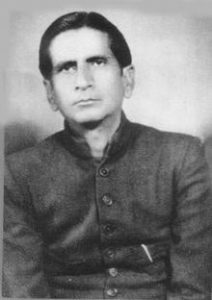 Asrarul Haq Majaz
Asrarul Haq Majaz
(Asrārulḥaq Majāz)
1911 – 1955
 Asrarul Haq Majaz
Asrarul Haq MajazAsrarul Haq Majaz (Asrārulḥaq Majāz; 1911-55; also Asrar-ul Haq Majaz; also called Majaz Lakhnavi) was born Asrarul Haq (Asrārulḥaq) in Rudauli, Barabanki District, in what is today Uttar Pradesh. He started writing poetry while a student at Aligarh Muslim University, for which he wrote the school’s anthem. At Aligarh he befriended a group of poet contemporaries such as Makhdum Mohiuddin, and Ali Sardar Jafri (1913-2000), and was swept up in the nascent, exciting, and highly politicized Progressive Movement. It was also at Aligarh that he attracted a large number of young admirers, especially among the women students at the Women’s College, among them the teenager Ismat Chughtai (1915-91), who, as an adult, wrote a famous essay on him describing how some of the girls in her dormitory placed copies of his poetry under their pillows at night. His first volume of poems, Āhang (Melody) appeared in 1938 and is dedicated to Faiz Ahmed Faiz (1911-84) and his friend from Aligarh days, Moin Ahsan Jazbi (1912-2005). It contains many of his finest romantic and revolutionary poems, notably “Rāt aur rel” (Night and Train),* “Āvāra” (Vagabond),* and “Mujhe jānā hai ek din” (I’ll Have to Go One Day).* The collection was republished twice, each time with additional poems and a new title.
He was a serious alcoholic, and throughout the remainder of his life various attempts by family, friends, and highly placed people (e.g., poet-politician and Gandhi close associate Sarojini Naidu) to address this problem failed. By 1947 his physical and mental condition deteriorated so severely that he was committed to a mental institution. He eventually died on a frigid December night in Lucknow, alone, following a rowdy drinking bout with friends. Ismat Chughtai published a famous essay on him, “Asrarul Haq Majaz,” My Friend, My Enemy (2001) 269-84. Also see Sami Rafiq, “Asrarul Haq Majaz: Introduction,” Indian Literature, 56:5 (2012) 38-59; Hamida Salim, “Majaz, My Brother,” Indian Literature, 56:5 (2012) 60-75; and Carlo Coppola, “Asrarul Haq Majaz: The Progressive Poet as Romantic,” Urdu Poetry, 1935-1970: The Progressive Episode (2017) 410-41.
Poetry
2. Andherī rāt kā musāfir / Dark-Night Traveller
4. Barbat̤-i shikastah / Broken Lute
5. Bol! ari o dhartī bol! / Speak up, O You Earth, Speak up!
6. Ek dost kī ‘k̲h̲ush mazāqī’ par / On the ‘Good Taste’ of a Friend
8. Ḥusn ko be hijāb honā thā / Beauty was destined to be unveiled
9. Kuch tujh ko k̲h̲abar ham kyā / O turmoil of the age
10. Shauq ke hāthon̲ ae dil-i muz̤t̤ar / O distressed heart
12. Ishārāt-i tanhāʼī / Pleasure of Loneliness
14. Khvāb-i saḥr / Dream of Dawn
16. Mazdūron̲ kā gīt / Workers’ Song
17. Mujhe jānā hai ek din / I’ll Have to Go One Day
18. Naujavān k̲h̲ātun se / To the Young Lady
19. Naujavān se / To the Young Man
20. Nazr-i k̲h̲ālidah / Offering to Khalida
21. Pahlā jashn-i āzādi / First Freedom Festival
22. Pardah aur ʻiṣmat / Purdah and Chastity
23. Rāt aur rel / Night and Train
27. T̤iflī ke k̲h̲vāb / Childhood Dreams
28. Vatan āshob / Threnody on the Destruction of the Country

